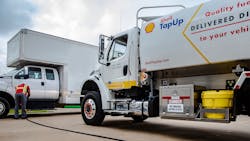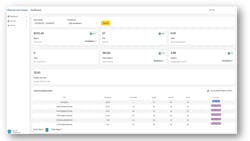Shell TapUp's mobile fueling optimizes fleets' downtime, prevents theft
Setting up a specific time to refuel your fleet’s assets during downtime can be just as beneficial as preventive maintenance scheduling when it comes to maximizing uptime and even balancing a shop’s budget.
Monitoring accurate fuel spend and preventing fuel theft also come with the territory when a fleet tracks and schedules refueling times.
That’s where mobile fueling comes in.
See also: How truck drivers can improve fuel efficiency
Mobile fueling all but eliminates the need for drivers to fill up off-site, according to Prabhu Murugan, general manager at Mobile Fueling US at Shell.
Shell TapUp’s Mobile Service Champions travel to fleet lots and fill up vehicles or an on-site tank during downtime. With the Total Fuel Spend option, the cost of that fuel is listed in the Fleet Services Tracker, helping to forecast future fuel costs.
“Taking drivers out of the fueling process allows them to concentrate on value-added services,” Murugan said. “They can focus on the task at hand and not have to worry about fuel.”
The tracker, designed to be a one-stop shop for fueling data, logs fuel usage which can be viewed by fleet managers in real time, providing an accurate accounting of fuel usage and spend, preventing fuel theft by bad actors either on the road or even in the cab itself.
See also: Risk management tools to mitigate crashes, theft
Murugan suggests that monitoring fuel usage also alerts fleets that a vehicle might have issues that need to be addressed outside of regular maintenance intervals.
And while the price of fuel can and will fluctuate over time, simple mathematics calculates cost per mile, he explained, adding that by using the data in the Fleet Services Tracker, a fleet manager can tally that vehicle’s fuel efficiency over time and take action to address either driver behavior or maintenance issues.
"If the number of gallons of fuel the vehicle receives is above average that might be an indicator that vehicle maintenance is needed," he said. "Add a telematics solution to the mix, and the data becomes even more clear for vehicle efficiency."
About the Author
Cris Beaulieu
Cris Beaulieu is an Associate Editor for Fleet Maintenance magazine. She joined the team after working in local news media. She earned a bachelor’s in journalism at Cleveland State University along with a TV and Radio Broadcast degree at Ohio Media School.


